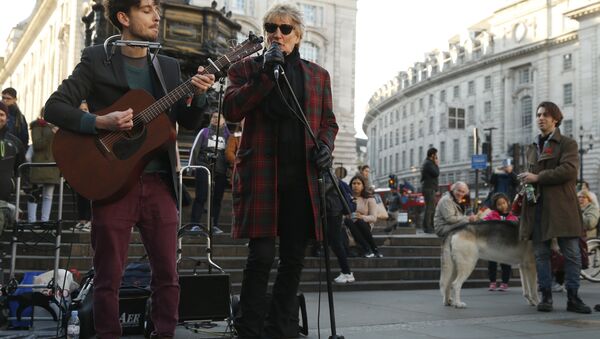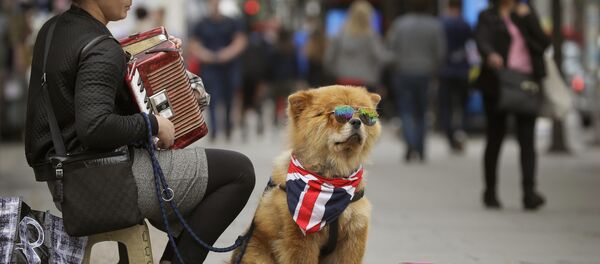Westminster and Chelsea councillors have begun adopting PSPOs aligned with the 2014 Antisocial Behaviour, Crime and Policing Act, which some speculate could be used to target other demographics in London, sources say.
Sputnik reached out to The Busking Project and the Mayor of London's "Busk in London" programme to find out more information about what the Capital is doing to preserve and promote its thriving busking community.
Nick Broad, co-founder of the The Busking Project told Sputnik that busking was essential to preserving the music industry, which was slowly "being concentrated in the hands of fewer artists".
"The UK's live music venues are closing," Mr. Broad said. "Nobody has a CD player anymore and Spotify barely pays. More profits are being concentrated in the hands of fewer artists."
"Show me any other way an independent, starting artist of any kind (circus, music, dance, whatever) can make a living with their art."
"Lord Taylor of Holbeach said PSPO legislation would not be used in this way," he stated. "PSPOs are a disgusting use of power, criminalising certain types of behaviour, by certain people, in certain places."
"I thought the law was supposed to be equal for all of us," he added.
Sputnik reached out to the Mayor of London's ‘Busk in London' project, who declined to comment directly but offered information on multiple programmes currently in place.
Former London mayor Boris Johnson began the Busk in London programme, with current London mayor Sadiq Khan continuing the tradition by launching International Busking Day in 2016.
Sydney, Reykjavik, Rio, Tokyo and dozens of other international hubs hallmarked the third annual event alongside London on 21 September.
The festival took place at the SSE Arena in Wembley, which received the Mayor's London Borough of Culture title in 2020 and featured acclaimed artist Newton Faulkner, singer-songwriter Nina Nesbitt, and busking musicians from across the globe.
READ MORE: Yellow Vests in Corsica: 'We're in Deep S**t. It's Rude, but It's True'
"London has one of the most vibrant and diverse busking scenes in the world," London Mayor Sadiq Khan said in a press statement, adding that the event would be "a great day for families across the city [to] enjoy a fantastic showcase of the city's talent, music and street performances".
Mayor Khan said that London was "joining forces with other great cities to show that buskers make a huge contribution to creativity and culture" and "will play an important role in inspiring the next generation of musical talent in London," where creativity was "in every corner of our city."
"Busking is the soundtrack to the underground and the streets, it's part of living in London", Newton Faulkner said. "I don't think the city would be the same without it."
Singer-songwriter Nina Nesbitt said that she had "started out with just my guitar and being from near Edinburgh I was always surrounded by buskers during the festivals."
Gig's Competition
London's Gig's competition took place on 2 September at Westfield London in Shepherd's Bush, where musicians competed for up to £15,000 in prizes, paid gigs, musical gear, and recording time.
Londoners have been showcasing their talents whilst earning vital training and connections at the Mayor's flagship competition for roughly 10 years.
CMO Europe and group director of brand and strategic marketing for Unibail-Rodamco-Westfield Myf Ryan said she had taken part in the event since 2012, adding that she was "pleased to be able to given emerging talent a platform to showcase their talents."
iZettle — Busk in London Partnership
Busk in London also launched a partnership with Swedish fintech company iZettle in May 2018 to help buskers use point-of-sale (POS) transactions via contactless cards, wearables, or chip and pin payments. The technology's ‘Repeat Payments' feature allows buskers to set a fixed payment on card terminals where people can simply ‘tap and go' as the artist performs, eliminating the need for tossing coins into a guitar bag.
"If street performers like myself don't adapt to the cashless society we are edging towards, we're at risk of becoming a dying art," full-time busker Charlotte Campbell said.
"It has already had a significant impact on the contributions I've received," she continued. "More people than ever tap to donate whilst I sing, and often, when one person does, another follows."
An iZettle spokesperson told Sputnik that the company began equipping a "handful of buskers" with iZettle Readers to test public response to accepting cashless contributions.
"We also launched our Repeat Payments feature which allowed the buskers to set their Readers at a certain amount, for example, £5, and accept continuous contributions, allowing passersby to simply tap to show their support," the spokesperson said.
"Until now street performers and buskers have been reliant on cash contributions to earn a living. With fewer people carrying cash, we wanted to make sure that the amount they are able to make is unaffected by this. Now, they can accept contactless contributions through iZettle."
The spokesperson also stated that her company has "seen a significant uptake in the number of buskers and street performers using iZettle to accept contactless payments" and that "the feedback has been very positive".
"Busk in London also informed us that in some cases buskers earnings have increased by up to 50% since using iZettle to accept contactless contributions."
The Stockholm-based company is a subsidiary of PayPal and operates in 12 countries, including the UK, Spain, Germany, Sweden, the Netherlands, France and others.




